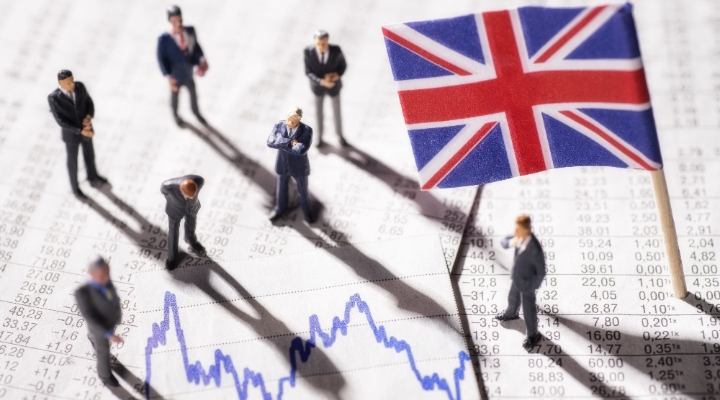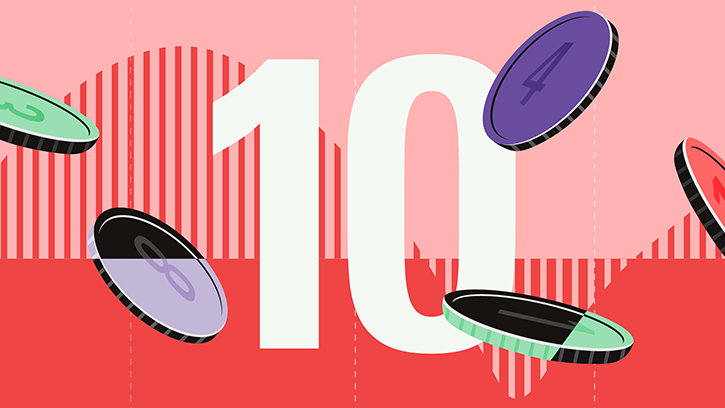
UK stocks were caught up in last week's turbulence but showed more resilience than those in the US and Japan.
While the absence of tech giants has held UK equities back in the last five years, this has proved a bonus in the latest market volatility. The Morningstar UK index fell over a three-month period but is still up nearly 9% in GBP since the start of the year.
Combined with a new period of political stability, falling inflation and better-than-expected economic growth, investors are starting to reconsider the potential for UK equities after a period of being an "unloved" market.
But what are the most attractive UK stocks at the moment? Fair value is one way of measuring this – and many of the companies below are screening as more undervalued since the list was last run a month ago.
How Did We Select the Best UK Companies?
Key to a company's success lies in its competitive advantage, or "economic moat", as famously coined by Warren Buffett.
Morningstar analysts have built on this idea, categorising companies as having a narrow, Wide, or no Economic Moat.
So to start, the list of 16 of the best UK companies to own is made up of companies with a wide economic moat.
The Morningstar Fair Value Uncertainty Rating has also been used to assess UK stocks. This metric ranges from low to extreme, capturing analysts' confidence levels about companies’ cash flows when assigning fair value estimates. The UK stocks listed below have been screened to only include those with low or medium uncertainty levels.
A company's Capital Allocation Rating considers investment strategies, balance sheets, and shareholder distributions. The list below only includes UK companies with standard or exemplary capital allocation.
Finally, the list is sorted by most to least undervalued, starting with 5-star stocks (most undervalued) through 4, 3 and 2-star stocks.
Undervalued Stocks
Diageo PLC (DGE)
• Sector: Consumer Defensive
• Morningstar Rating: ★★★★★
• Morningstar Uncertainty Rating: Low
• Capital Allocation Rating: Standard
The owner of over 200 alcoholic beverage brands from the likes of Captain Morgan to Smirnoff Vodka is trading below its fair value estimate of £31.
"Diageo was created in 1997 following the merger of Grand Metropolitan and Guinness. Mergers and acquisitions remain part of the firm's DNA, and subsequent transactions – some transformative, others bolt-on – have established Diageo as a global industry leader," says analyst Jelena Sokolova.
"Although the industry is fairly concentrated (we estimate a fourfirm concentration ratio of 0.6, above many other fast-moving consumer goods categories, including the global brewing industry at 0.5), we believe there is more consolidation to come."
"Outside the top five firms, the industry is highly fragmented, and regional players often dominate in niche product categories or local markets. These firms present a new wave of merger opportunities for the industry consolidators, including Diageo, to grow their developing markets footprint."
British American Tobacco (BATS)
• Sector: Tobacco
• Morningstar Rating: ★★★★★
• Morningstar Uncertainty Rating: Medium
• Capital Allocation Rating: Standard
British American Tobacco's leading brands are Dunhill, Kent, Pall Mall, Lucky Strike, and Rothmans in cigarettes. Its ownership of the Camel, Natural American Spirit, and Newport brands are limited to the US.
In next-generation products, the company has the Vuse brand in vaping, Glo in heated tobacco, and Velo in modern oral tobacco. The company also owns a 25.5% stake in ITC limited, the largest Indian cigarette company.
"British American Tobacco is the world’s second-largest tobacco company by volume, with cigarette sales to over 180 countries. But with global cigarette consumption declining about 5% per year, BAT has invested in several next-generation products that can deliver nicotine with reduced risk. This strategy makes sense, but we think the firm has placed too many bets, leading to it becoming a 'jack of all trades, master of none'," says Kristoffer Inton at Morningstar.
Melrose Industries (MRO)
• Sector: Industrials
• Morningstar Rating: ★★★★★
• Morningstar Uncertainty Rating: Medium
• Capital Allocation Rating: Standard
"Melrose Industries is a UK-based company that manufactures engines and structures products for all major OEMs across civil and defense markets," says Loredana Muharremi, Senior Equity Analyst at Morningstar.
"The company derives around 75% of its revenue from civil and the remaining from defence. In the civil market, the company operates in 90% of existing fleets in service and is a demonstrator partner in the GTF and CFM RISE nextgeneration engines for narrow-body aircraft."
Reckitt Benckiser Group (RKT)
• Sector: Consumer Defensive
• Morningstar Rating: ★★★★★
• Morningstar Uncertainty Rating: Medium
• Capital Allocation Rating: Standard
Reckitt Benckiser was recently rebranded under the corporate name Reckitt, it sells a portfolio that includes a variety of household and consumer health brands, such as Lysol, Finish, Durex, and Mucinex, many of which hold the number-one or -two positions in their categories globally.
"The majority of Reckitt’s portfolio is well positioned in categories that benefit from secular growth drivers across consumer health and hygiene. The acquisition of Mead Johnson has added to its portfolio a leadership position in infant nutrition – a segment with substantial pricing power," says Diana Radu, equity analyst at Morningstar.
BAE Systems PLC (BA.)
• Sector: Aerospace & Defense
• Morningstar Rating: ★★★★
• Morningstar Uncertainty Rating: Medium
• Capital Allocation Rating: Standard
BAE Systems is a British global defense, security, and aerospace company and the largest defense contractor in Europe; it is one of six prime contractors to the US Department of Defense.
BAE Systems is currently trading below Morningstar’s fair value estimate of £14.90.
"BAE Systems enjoys incumbent positions on a diverse set of major global defense programmes. Defence spending in the US, a key market for BAE, declined for nearly a decade since the end of the Iraq war in 2011. The outlook for defense spending is positive with rising budgets in the U.S. and commitments from NATO partners to meet their minimum spending requirements. BAE Systems is well aligned with U.S. Department of Defense growth programmes," says Joachim Kotze, Morningstar equity analyst.
"BAE’s 15% programme share on the F-35 Lightning II fighter, currently in ramp-up, will support revenue for the next 15-20 years on production alone. US combat vehicle production and revenue is set to double over the next five years with subsequent margin improvements as the group resolves ramp-up issues."
Spirax (SPX)
• Sector: Industrials
• Morningstar Rating: ★★★★
• Morningstar Uncertainty Rating: Medium
• Capital Allocation Rating: Standard
Spirax Group PLC is a global manufacturer of a wide range of applications for industrial and commercial steam systems, electric thermal solutions and peristaltic pumps used across multiple industries.
The company is currently trading below its fair value estimate of £95.50.
"We think there could be an element of conservatism baked into expectations by Spirax’s new executive team and believe its long-term outlook remains solid, underpinned by a recovery in its highest-margin Watson-Marlow segment," writes Matthew Donen, senior equity analyst at Morningstar.
"Shares are currently trading at an attractive 20% discount to our revised fair value estimate. We believe uncertainty surrounding the timing of a recovery in some of its material end markets and a somewhat untested new management team are weighing on the share price, which presents a buying opportunity for investors."
Rentokil Initial (RTO)
• Sector: Industrials
• Morningstar Rating: ★★★★
• Morningstar Uncertainty Rating: Medium
• Capital Allocation Rating: Exemplary
Rentokil Initial is the largest global provider of pest control and commercial hygiene services, operating in 83 countries.
The group also offers a range of specialist services including office and commercial space plant care, property care, and workwear rentals.
"We assign Rentokil Initial a wide moat rating owing to the superior cost position of its global industry-leading pest-control franchise. Rentokil is the world's largest commercial pest-control business, boasting leading market shares in the vast majority of the 87 countries in which it operates. This has been achieved in large part via vigorous tuck-in acquisition activity aimed at reaping the cost benefits, which accrue to a route-based business like pest control as density of service provision increases," says Grant Slade, senior equity analyst at Morningstar.
GSK (GSK)
• Sector: Healthcare
• Morningstar Rating: ★★★★
• Morningstar Uncertainty Rating: Medium
• Capital Allocation Rating: Standard
In the pharmaceutical industry, GSK ranks as one of the largest firms by total sales.
The company wields its might across several therapeutic classes, including respiratory, cancer, and antiviral, as well as vaccines. GSK uses joint ventures to gain additional scale in certain markets like HIV.
"As one of the largest pharmaceutical and vaccine companies, GSK has used its vast resources to create the next generation of healthcare treatments. The company's innovative new product lineup and expansive list of patent-protected drugs create a wide economic moat, in our opinion," writes Damien Conover, senior equity qnalyst at Morningstar.
"The magnitude of GSK's reach is evidenced by a product portfolio that spans several therapeutic classes. The diverse platform insulates the company from problems with any single product. Additionally, the company has developed next-generation drugs in respiratory and HIV areas that should help mitigate both branded and generic competition. We expect GSK to be a major competitor in respiratory, HIV, and vaccines over the next decade."
Fairly Valued Stocks
AstraZeneca (AZN)
• Sector: Healthcare
• Industry: Drug Manufacturers- General
• Morningstar Rating: ★★★
• Morningstar Uncertainty Rating: Medium
• Capital Allocation Rating: Exemplary
AstraZeneca is the largest company by market capitalisation on the FTSE 100.
The pharmaceutical company sells branded drugs across several major therapeutic classes. The 3-star stock is trading at £126.52 beating its fair value estimate of £124 per share.
"AstraZeneca has built its leading presence in the pharma and biotech industry on patent-protected drugs and a developing pipeline that add up to a wide moat. The strong replenishment of new drugs is setting up industry-leading growth," says Morningstar Analyst Damien Conover.
"AstraZeneca's pipeline is emerging as one of the strongest in the drug group, and we think the company is developing several key products that hold blockbuster potential. In particular, the company's launched cancer drugs Tagrisso, Imfinzi, Lynparza, and Calquence are well positioned based on leading efficacy in hard-to-treat cancers."
Haleon (HLN)
• Sector: Healthcare
• Morningstar Rating: ★★★
• Morningstar Uncertainty Rating: Medium
• Capital Allocation Rating: Standard
Haleon is a British healthcare company which was spun out of GSK and the stock is trading screening as fairly valued.
"We assign Haleon a wide moat because we believe the company’s strong brand reputation, robust pricing power (intangible assets), and, to a lesser extent, economies of scale (cost advantage) should continue to support economic profits for at least the next 20 years," says Morningstar analyst Keonhee Kim.
"In consumer health, and especially over-the-counter markets, real product differentiation is low but perceived product differentiation is high, allowing products with strong brand power to win over competitors. Haleon’s portfolio includes global power brands such as Sensodyne, Centrum, Advil, and Voltaren as well as a number of local brands including Tums, Eno, Emergen-C, and Caltrate."
London Stock Exchange Group (LSEG)
• Sector: Financial Services
• Morningstar Rating: ★★★
• Morningstar Uncertainty Rating: Medium
• Capital Allocation Rating: Exemplary
The London Stock Exchange group, or better known as the LSEG, operates in the financial data and stock exchanges industry. It has a 3-star rating, meaning it is fairly valued.
It has doubled down on its market data and analytics strategy after its Refinitiv acquisition.
"With the closing of the Refinitiv acquisition, LSEG has turned itself into a fully vertically integrated financial exchange data company. The group controls key global assets ranging from equity, fixed income, and foreign-exchange trading over the collection, management and distribution of trading-related data sets and indexes down to post-trade clearing and reporting services," says Morningstar analyst at Niklas Kammer.
"LSEG offers a comprehensive ecosystem, which allows it to capture and retain clients via multiple touch points across the value chain. Furthermore, it enables the group to extract additional value from its core intellectual property, with its trading and post-trading data sets feeding its pretrading analytics and benchmark business, reinforcing its customer switching costs and intangible asset moat sources."
RELX (REL)
• Sector: Information
• Morningstar Rating: ★★★
• Morningstar Uncertainty Rating: Low
• Capital Allocation Rating: Exemplary
RELX is global provider of information-based analytics and decision tools for professional and business customers in various industries.
"RELX, based in the UK, is a global provider of business information, analytics, and decision-making tools for professionals in various industries. It generates revenue mainly by creating and selling access to curated information databases, analytics, and journals. In addition, RELX organises major events such as trade shows and conferences," writes Rob Hales, senior equity analyst at Morningstar.
"Nearly all information and analytics products are delivered digitally, print is now a minor part of the business. Offerings are sold mainly by subscription, which accounts for around 55% of revenue. However, the majority of the remaining 45% transactional revenue is under long-term contracts with volumetric elements, so essentially recurring in nature."
InterContinental Hotels Group PLC (IHG)
• Sector: Consumer Cyclicals
• Morningstar Rating: ★★★
• Morningstar Uncertainty Rating: Medium
• Capital Allocation Rating: Standard
InterContinental, the British-American luxury hotel brand, operates 946,000 rooms across 19 brands with Holiday Inn and Holiday Inn Express constituting the largest ones.
Its stock is currently trading close to its fair value estimate.
"Not only does InterContinental rank among the top companies in the hotel industry on these metrics, but it has shown evidence of expanding on its brand intangible asset while maintaining its strong switching cost advantage. As a result, we see InterContinental generating economic profits beyond the next 20 years and rate its moat as wide," says Dan Wasiolek, senior equity analyst at Morningstar.
"InterContinental’s owners are attracted to its brand since they are allowed to team up to spend around $2.5 billion annually toward marketing, reservation, distribution, and loyalty. This exceeds the $600 million-$800 million outlay of narrow-moat peers Wyndham and Choice, buoying InterContinental’s brand intangible edge."
Imperial Brands (IMB)
• Sector: Consumer Defensive
• Morningstar Rating: ★★★
• Morningstar Uncertainty Rating: Medium
• Capital Allocation Rating: Standard
The second tobacco company on our list, Imperial Brands is trading at £21.32, while Morningstar’s Fair Value Estimate is £23.
"Imperial Brands is in the middle of a five-year strategic plan launched in 2021 that looked to position the firm as a fast follower in next-generation products while strengthening its share in its most important markets. This makes sense, given its relatively smaller size to peers like Philip Morris International and British American Tobacco, which leaves it less financial capacity to lead innovation. Although this means Imperial will be more exposed to cigarettes, it also implies that it can maximise its free cash flow generation and returns to shareholders," says Morningstar analyst Kristoffer Inton.
Experian PLC (EXPN)
• Sector: Credit ratings
• Morningstar Rating: ★★★
• Morningstar Uncertainty Rating: Medium
• Capital Allocation Rating: Standard
"Experian is one of the Big Three credit bureaus. Experian's US core credit bureau business is relatively mature and, as a result, the company has been expanding through adjacent products and in emerging markets," writes Rajiv Bhatia, equity analyst at Morningstar.
"Experian continues to focus on geographic diversification. In fiscal 2024, Experian generated about 66% of its revenue from North America, a touch less than TransUnion and Equifax."
"Experian has developed a dominant position in Brazil, and we think the growth of middle-class populations in emerging markets and favorable regulatory changes (such as the use of more data types) will drive long-term growth. We see some long-term opportunities in Asia, but the payoff is a bit more uncertain and execution has been lackluster. The story in the emerging markets is not seamless and the firm has faced currency and macroeconomic headwinds."
Overvalued Stocks
Unilever PLC (ULVR)
• Sector: Consumer Defensive
• Morningstar Rating: ★★
• Morningstar Uncertainty Rating: Medium
• Capital Allocation Rating: Standard
Unilever, the British consumer goods company, is trading above Morningstar’s fair value estimate of £43.80. The company’s brands range from Ben & Jerry’s ice cream to Dove Soap.
"We think Unilever has a wide economic moat derived from three sources: its entrenchment in the supply chain of retailers (an intangible asset), brand power in certain categories, and a cost advantage," Ioannis Pontikis, senior equity analyst at Morningstar writes.
"The firm’s broad portfolio of products across multiple categories and supermarket aisles creates a virtuous cycle of competitive advantages comprising intangible assets and cost advantages that new entrants cannot easily replicate."
However, Unilever’s sales in the second quarter of the year underperformed forecasts. The sales growth grew 3.9% in comparison to the 4.2% that analysts expected.
The business is also planning to separate its ice cream business, and will cut about a third of all office roles in Europe by the end of next year to focus on boosting growth.



























